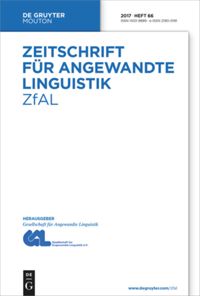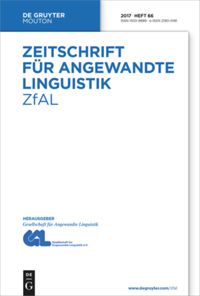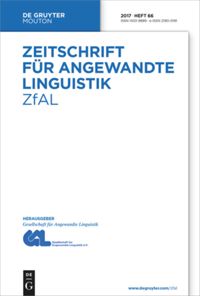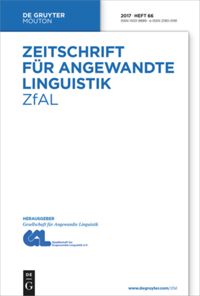Alle Informationen unter https://gal2025.de
#GAL2025 #CfP

This article presents a multi-level annotation approach for argumentative learner texts that was developed as part of an interdisciplinary DFG project. The project aims at the automated generation of individualized, development-promoting and learner-sensitive feedback on argumentative student texts and is situated in the field of AI-supported text production. To generate automated feedback, the first step was to manually annotate an extensive text corpus consisting of 1,320 argumentative texts written by fifth and ninth graders. This then formed the basis for the development of corresponding computational linguistic procedures. The article focuses on the special features as well as the challenges that arose in connection with the annotation of learner texts and the generation of learner-sensitive feedback. The article is structured as follows: First, the relevant computational linguistics and language didactics research findings and digital support systems for argumentative writing are outlined. In the main part, the procedure of multi-level annotation is explained in detail. Due to the methodological approach, above-average inter-annotator agreement was achieved resulting in the multi-level approach implemented being adaptable for further corpus-based studies. Finally, the results are interpreted and discussed.

So far, much research has been done on practices of explaining and their functions both in informal and institutional settings. Explanations are used to ensure shared understanding and to provide for intersubjectivity. While explanations are typically larger structures, there also exists a small form, the explication, which is mainly used to clarify items on a word level. Originating in philosophy, where explications are the format used to give an exact meaning of a technical term, they are also used regularly in everyday settings. Here, they work in both directions, as explications in everyday terms of a technical expression or as explications of an everyday expression in terms of a technical one. On the basis of German and Russian oncological doctor-patient-interactions, all instances of explications are extracted and classified into different formal and functional groups.

This article seeks to clarify the discourse-analytical use of the terms topos and narrative using a corpus of German language press articles written about a visit of the German federal government to Canada in August 2022. Starting from the dominant topos of ‘shared values’, the question of how this topos was combined with other narratives is discussed, thus illustrating how the Russian war of aggression against Ukraine formed the basis for Germany's vision of an overall energy policy at that time. In addition to the empirical findings, fundamental considerations about the interplay of topoi and narratives are derived from the present study.

This paper focuses on teacher induction in the German federal state of North Rhine-Westphalia. Similar to the academic teacher training program, the teacher induction curriculum mentions several regulations on language education and multilingualism as an element of teacher professionalization. However, very little is known about how the ‘Centres for Teacher Induction’ ( Zentren für schulpraktische Lehrereausbildung ) implement the curriculum. These centres provide weekly seminars for in-service teacher induction covering pedagogy and teaching methods. The induction phase constitutes a crucial interface between theory and practice. Thus, this paper discusses how the curriculum is delivered and how knowledge about multilingualism can be situated within theoretical discourse and teaching practice. Thirteen semi-structured expert interviews were analysed using qualitative content analysis. Results show that concepts of multilingualism and multilingual pedagogies are oriented towards a specific sub-area of language education that aligns with academic linguistic registers. While technical and academic registers seem to be commonly implemented at teacher training institutions, only rudimentarily training is given in a holistic and resource-oriented view on multilingualism.